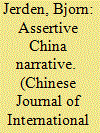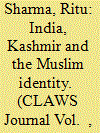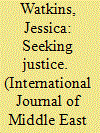| Srl | Item |
| 1 |
ID:
131993


|
|
|
|
|
| Publication |
2014.
|
| Summary/Abstract |
Dissenting assaults on the conventional wisdom that China's foreign policy became more 'assertive' in 2009-2010 have intensified. In this article I develop this revisionist critique in three ways. First, to make the most valid and cumulative assessment of the accuracy of the 'assertive China narrative' to date, I conceptualise its key empirical claim as a case of the general phenomenon of 'foreign policy change'. Second, based on this framework, I present a range of new empirical evidence that, taken as a whole, strongly challenges the notion of a new Chinese assertiveness. Third, since academic China and Asia experts played a pivotal role in creating the narrative, I raise a comprehensive explanation of why a great many scholars so strikingly went along with the flawed idea.
|
|
|
|
|
|
|
|
|
|
|
|
|
|
|
|
| 2 |
ID:
139178


|
|
|
|
|
| Summary/Abstract |
Territory has always played a pivotal role in inter-state rivalry. John A Vasquez has said that the value of territories increases due to their strategic locations, such as if they provide access to the sea or are a source of water. But territories acquire another important dimension if they are home to ethnic and religious communities that form part of the neighbouring state.1 The state of Kashmir presents one such enduring conflict where the separatist demands in the state of Jammu and Kashmir (J&K), coupled with the irredentist claim of Pakistan, have helped in shaping a narrative in India. The popular assumption in India is that ‘Muslim separatism’ got manifested in the form of the country’s partition in 1947 and the prevalent contention is that Muslims had a choice of political identity but they chose one based on religion.2 This has resulted in an unintended linking of the Kashmiris’ demand for greater autonomy or a separate state with the identity of Muslims in the rest of India.
|
|
|
|
|
|
|
|
|
|
|
|
|
|
|
|
| 3 |
ID:
131514


|
|
|
|
|
| Publication |
2014.
|
| Summary/Abstract |
In Jordan, tribal dispute settlements have played a Pivotal Role in the management of various types of grievances between individuals since long before the establishment of the modern state. To varying degrees, Jordanians-from the East and West Banks, Muslim and Christian, urban and rural-cherish the kinship networks associated with these procedures, and the ?a?wa (truce) and ?ul? (reconciliation) processes remain time-honored mechanisms for preventing revenge and making amends for wrongs committed. However, under the state's influence, the purpose of observing tribal settlements is evolving within an increasingly heterogeneous society. Drawing on documentary analysis combined with ethnographic material from across the kingdom, this article investigates the current status of tribal dispute resolution traditions among different sectors of the population. I argue that observance of such traditions can signify conformity with the hegemonic values that the state promotes as well as resistance to aspects of state control.
|
|
|
|
|
|
|
|
|
|
|
|
|
|
|
|